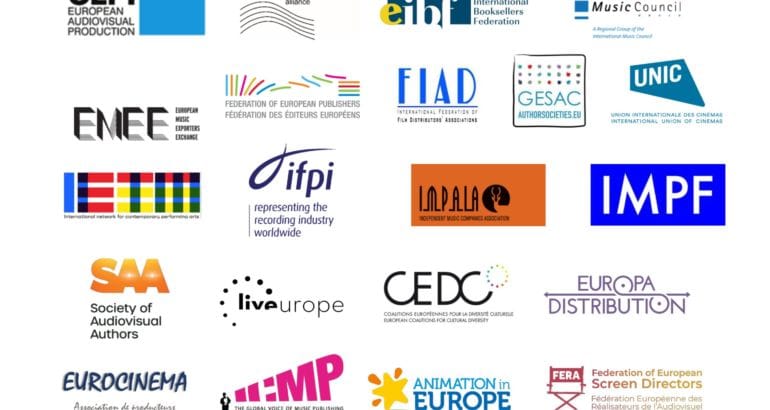Joint letter supporting amendments for recovery & resilience facility
21 organisations from across the cultural and creative sector have written to members of the European Parliament to ask them to support a number of amendments tabled on the draft Report on a Recovery and Resilience Facility.
You can read the full letter below.
The amendments detailed are in line with the European Parliament’s recent call, in its Resolution on the cultural recovery of Europe, for at least 2% of the Recovery and Resilience Facility to be earmarked for the cultural and creative sector.

Dear Member of the European Parliament,
We are writing to you as organisations from across the cultural and creative sector, to ask you to support a number of amendments tabled on the draft Report on a Recovery and Resilience Facility.
You will find the compiled amendments in the attached document, and we list them below.
It’s been said many times before, but it bears repeating: the cultural and creative sector was one of the first and hardest hit by the crisis, and will be one of the last to come out of it. As the economy is slowly restarting, the culture sector is still very much in limbo.
These amendments are in line with the European Parliament’s recent call, in its Resolution on the cultural recovery of Europe, for at least 2% of the Recovery and Resilience Facility to be earmarked for the cultural and creative sector.
While the cultural and creative sector has rightly been identified by the Commission as one of 14 ecosystems which are the hardest hit by the Covid crisis, we need confirmation that our sector will be prioritised in the EU’s recovery plan. More clarity and guarantees are needed to ensure the sector can benefit appropriately from the plan’s various instruments.
We ask you to support the following amendments which specifically call for at least 2% of the Recovery and Resilience Facility to be earmarked to support the cultural and creative sector:
-Amendment 151 (Nienass, Kammerevert & co) – Recital 4a (new)
-Amendment 153 (Kammerevert, Negrescu & co) – Recital 4b (new)
-Amendment 263 (Mavrides, Gardiazabal Rubial, Fernández) – Recital 11d (new)
-Amendment 861 (Kammerevert, Negrescu & co) – Article 14 paragraph 2
-Amendment 864 (Nienass, Kammerevert & co) – Article 14 paragraph 2
We also ask you to support the following amendments which call more generally for the EU and member states to invest in the cultural and creative sector as part of the EU’s Recovery and Resilience Facility, and for the sector to be explicitly referred to in the scope of application of the Facility:
Amendment 135 (Kammerevert, Negrescu & co) – Recital 4
Amendment 152 (Kammerevert, Negrescu & co) – Recital 4a (new)
Amendment 171 (Kammerevert, Negrescu & co) – Recital 6 Amendment 228 (Ressler, Sokol) – Recital 10
Amendment 279 (Molnár, Belka, Heinäluoma, Angel) – Recital 12a (new)
Amendment 303 (Ressler, Sokol) – Recital 14
Amendment 344 (Kammerevert, Negrescu & co) – Recital 16
Amendment 403 (Ressler, Sokol) – Recital 21 Amendment 592 (Molnár, Belka, Heinäluoma, Angel) – Article 3 paragraph 1
Amendment 593 (Mavrides, Gardiazabal Rubial, Fernández) – Article 3 paragraph 1
Amendment 605 (Kammerevert, Negrescu & co) – Article 3 paragraph 1
Justification:
The crisis had, and still has, a disastrous impact on the livelihood of hundreds of thousands, if not millions, of creators and cultural professionals and on the ability of all cultural enterprises – especially micro, small and medium sized – to stay in business. The commission’s own figures show that the sector will experience turnover losses of around 80% in the second quarter of 2020, 50% in the third quarter, and 30% in the fourth quarter.
As our sector is made up predominantly of – but not limited to – micro-businesses, self-employed workers and freelancers, with a higher average percentage of youth employment than most sectors, it is particularly vulnerable in times of crisis. Which is why the cultural and creative sector as a whole calls for a swift and massive response at EU, national and sector level.
The recovery and resilience plans should duly take into consideration our sector, which usually receives little attention in the context of the European Semester but requires appropriate support, especially now as it is suffering considerably from the measures taken to contain the pandemic.
Yours sincerely,
The undersigned organisations:
Animation in Europe – Federation of Animation Producers Association
CEPI – European Audiovisual Production
ECCD – European Coalitions for Cultural Diversity
ECSA – European Composer and Songwriter Alliance
EIBF – European and International Booksellers Federation
EMC – European Music Council
EMEE – European Music Exporters Exchange
Eurocinema – Eurocinema – Association of cinema and television producers
Europa Distribution – The European Network of Independent Film Publishers and Distributors
FEP – Federation of European Publishers
FERA – Federation of European Screen Directors FIAD – The International Federation of Film Distributors’ Associations
GESAC – European Grouping of Societies of Authors and Composers
ICMP – The Global Voice of Music Publishing
IETM – International Network for Contemporary Performing Arts
IFPI – International Federation of the Phonographic Industry
IMPALA – The Independent Music Companies Association
IMPF – Independent Music Publishers International Forum Liveurope – The live music platform for new European talent
SAA – Society of Audiovisual Authors
UNIC – International Union of Cinemas